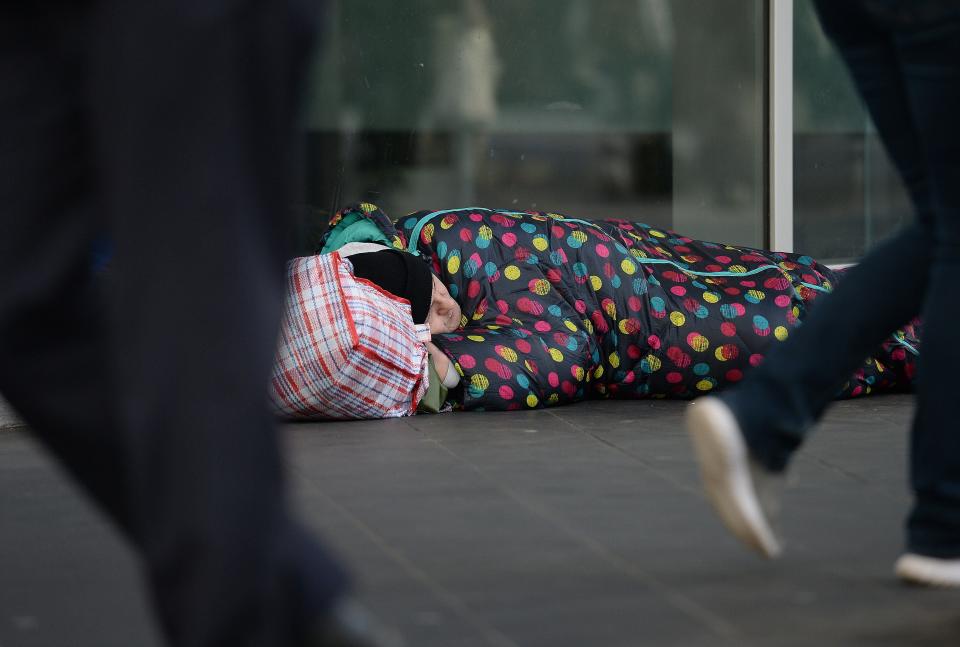Rough sleepers could be forced to stay out in the cold to avoid Covid, councils warn

Some councils have reported higher levels of rough sleeping than before the pandemic
(PA)Homeless people could be forced to stay out in the cold this winter to avoid catching Covid-19, according to a report for the Local Government Association.
The LGA warned that many councils face a choice between leaving people sleeing rough or bringing them into communal accommodation that risks spreading the virus.
It also highlighted a recent rise in the number of rough sleepers, with some local authorities reporting higher levels than before the pandemic.
The report by Local Partnerships, which is jointly owned by HM Treasury, the Welsh Government and the LGA, found the increase was partly due to rough sleepers returning to the streets after being housed temporarily under the government’s "Everyone In" scheme. Others were new to sleeping on the streets.
And while some councils will be able to provide emergency accommodation within hostels, hotels, B&Bs, others are concerned that they have no alternative than to offer "unsafe" communal spaces such as night shelters - which housing secretary Robert Jenrick said should be used "only as a last resort".
It comes after charities warned the government was putting lives at risk from to the double threat of coronavirus and cold weather. The chief executive of Crisis Jon Sparkes said: “We must not force people to choose between freezing on the street or a shelter, when both needlessly put lives at risk."
The government has announced £12m will be provided for severe weather emergency provision funding over the winter, but the LGA says that greater financial support is likely to be needed to get through the winter.
“Many councils have serious concerns about whether they can provide adequate emergency accommodation during cold weather and not increase the risk of COVID-19 spreading," said LGA housing spokesperson David Renard.
“As a result, some face an incredibly difficult choice of whether it would be better to leave people sleeping rough on the streets or bringing them indoors where they could be infected.
“The funding announced by the government so far has been helpful for councils, but it is unlikely to be enough to ensure that people sleeping rough get the support and protection they need this winter.
“The Everyone In initiative was a significant success, with councils acting rapidly to get the vast majority of people sleeping rough off the streets and into safe and suitable accommodation.
“But a period of extreme and severe weather could seriously jeopardise councils’ ability to protect people sleeping rough from COVID-19 during this second wave.”
Nearly 30,000 people were given accommodation under the “Everyone In” scheme and a study published in the Lancet in September estimated that efforts to house homeless people during the pandemic have already prevented 266 deaths, 1,164 hospital admissions and 21,092 coronavirus infections.
A spokesperson for the Ministry of Housing, Communities and Local Government said: “The government has taken unprecedented action to support the most vulnerable people in our society during the pandemic – backed by over £700 million to tackle homelessness and rough sleeping this year alone.
“Our work is ongoing and by September we had housed 29,000 vulnerable people; supporting over 10,000 into emergency accommodation and 19,000 into settled accommodation or with move on support.
"The forthcoming Spending Review will demonstrate this government’s continued commitment to not only building on the progress of ‘Everyone In’ and supporting rough sleepers during Covid-19, but also our commitment to ending rough sleeping for good.”
Read More
Ministers accused of putting lives at risk over homeless shelters
‘Tragedy in the making’ for homeless during lockdown, charities warn
Housing means life and death for the homeless during second lockdown

 Yahoo Finance
Yahoo Finance 